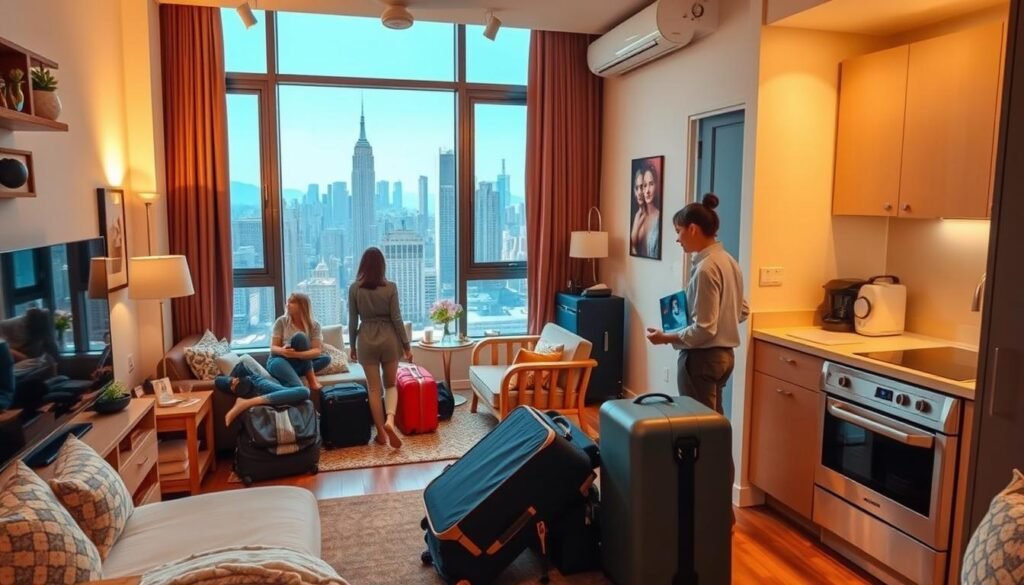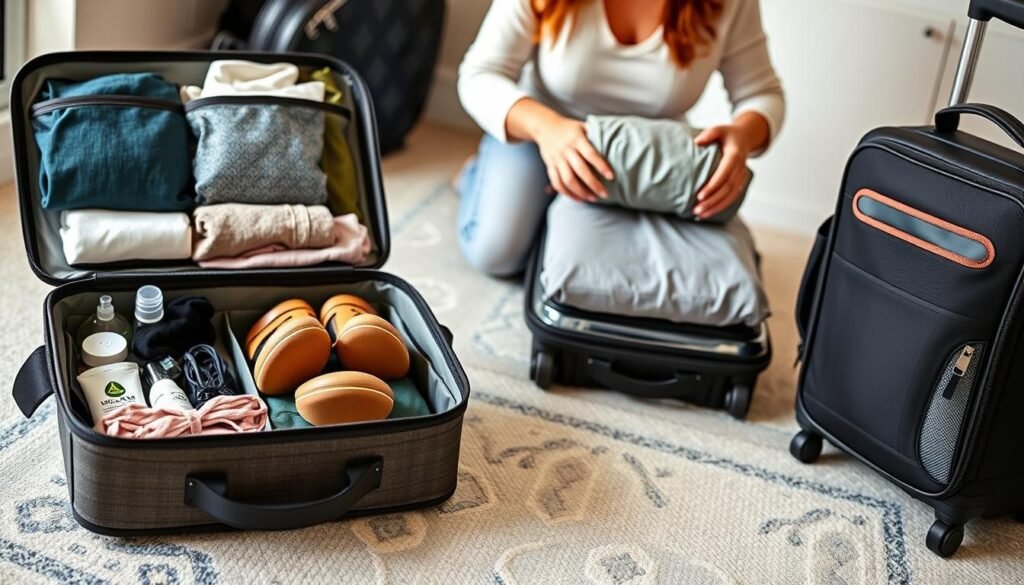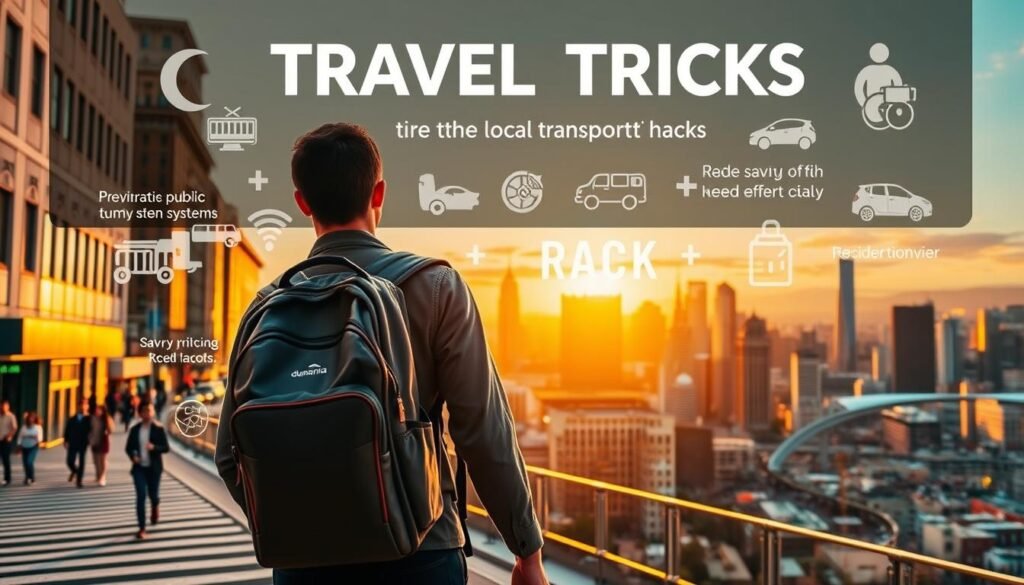سلة مشترياتك فارغة في الوقت الحالي!
Are you tired of overspending on your trips and wasting precious time on planning? What if you could explore the world without breaking the bank or sacrificing your precious vacation time? With the right strategies, travelers can enjoy a more efficient and cost-effective journey.
By implementing insider travel hacks, individuals can make the most of their trips. Effective travel planning is key to a stress-free and enjoyable experience. For those looking to optimize their next trip, contacting experts at info@dunamia.com can provide valuable insights and personalized advice.
Key Takeaways
- Effective pre-trip planning strategies
- Budget-friendly accommodation options
- Smart transportation choices
- Time-saving tips for a stress-free journey
- Cost-effective travel planning resources
Smart Pre-Trip Planning Strategies
Smart travelers know that pre-trip planning is vital for maximizing savings and minimizing hassles. Effective planning not only enhances the travel experience but also ensures that the journey is both enjoyable and stress-free.
When to Book: Timing Strategies for Maximum Savings
Timing is everything when it comes to booking flights, hotels, and other travel arrangements. Research indicates that booking flights at least 21 days in advance can lead to significant savings. For hotels, booking during off-peak seasons or using last-minute deals can result in substantial discounts.
“The key to getting the best deals is flexibility and being informed about price trends,” says travel expert, Jane Doe. Travelers should consider using fare comparison tools and setting price alerts to stay ahead of the game.
Digital Organization Tools That Streamline Your Planning
In today’s digital age, travelers have access to a plethora of tools designed to streamline the planning process. From itinerary builders to packing lists, digital organization tools can simplify travel planning. Apps like TripIt and Google Trips help travelers keep all their travel information in one place, making it easier to manage flights, hotels, and activities.
- TripIt: For organizing travel plans
- Google Trips: For managing itineraries
- PackPoint: For creating customized packing lists
Destination Research Methods That Pay Dividends
Researching a destination before traveling can greatly enhance the experience. Travelers should look into local customs, must-see attractions, and off-the-beaten-path locations. Websites like Lonely Planet and TripAdvisor offer valuable insights and recommendations from seasoned travelers.
“Understanding the local culture and being aware of your surroundings can make a significant difference in your travel experience,” notes Mark Smith, a seasoned traveler.
By adopting these smart pre-trip planning strategies, travelers can ensure a more enjoyable, stress-free, and cost-effective journey. For more travel tips and planning advice, contact us at info@dunamia.com.
Flight Booking Tactics to Cut Costs by 30%
Flight expenses can significantly eat into a travel budget, but savvy travelers can reduce these costs by implementing the right booking strategies. By understanding how to navigate the complexities of flight pricing, travelers can save a substantial amount on their trips.
Mastering Fare Comparison Tools and Price Alerts
One of the most effective ways to find cheap flights is by using fare comparison tools. Websites and apps like Google Flights, Skyscanner, and Kayak allow travelers to compare prices across different airlines, airports, and dates. Setting up price alerts can also notify travelers when prices drop or when a sale occurs.
To maximize savings, it’s essential to be flexible with travel dates and consider alternative airports. For instance, flying into a nearby city or on a different day can sometimes result in significant savings.
The Hidden Patterns in Airline Pricing Algorithms
Airline pricing algorithms are complex and influenced by various factors, including demand, competition, and fuel prices. Understanding these patterns can help travelers make informed decisions when booking flights.
For example, booking flights on off-peak days or during off-peak seasons can lead to cheaper fares. Additionally, being aware of sales trends and special promotions can help travelers snag the best deals.
| Day of the Week | Average Price |
|---|---|
| Monday | $450 |
| Tuesday | $420 |
| Wednesday | $400 |
Leveraging Stopover Opportunities and Open-Jaw Tickets
Another strategy for saving on flights is by considering stopover opportunities and open-jaw tickets. A stopover allows travelers to break up their journey, exploring an additional destination without significantly increasing the cost.
Open-jaw tickets, where travelers fly into one city and out of another, can also provide flexibility and savings. For example, flying into New York and out of Los Angeles can be cheaper than a round-trip ticket between the two cities.
By mastering these flight booking tactics, travelers can cut their costs by up to 30%, making their travel budget go further.
Accommodation Alternatives That Slash Expenses
Accommodation costs can be substantially reduced by adopting alternative lodging strategies. Travelers are no longer limited to traditional hotels; a plethora of options now exists to cater to various budgets and preferences.

Cost-Effective Lodging Options
Beyond hotels, travelers can opt for vacation rentals, hostels, or even house-sitting opportunities. Websites like Airbnb offer a wide range of accommodations, from shared spaces to entire homes, often at a fraction of the cost of a hotel room. For those looking for a more authentic experience, platforms like Couchsurfing allow travelers to stay with locals for free, fostering cultural exchange.
Key benefits of alternative lodging include:
- Cost savings
- Local experiences
- Flexibility in accommodation choices
Direct Booking Negotiation Scripts
When booking directly, travelers can often negotiate better rates or additional perks. A simple phone call or email can go a long way. For instance, saying, “I’m a repeat customer and am looking for a loyalty discount,” can yield positive results. As Kay Weinberg, a travel expert, notes, “Direct negotiation can lead to significant savings and a more personalized experience.”
“The key to successful negotiation is being respectful and flexible. Travelers should be prepared to discuss their needs and be open to compromise.”
Location Strategies to Minimize Transportation Costs
Choosing an accommodation that’s centrally located or near public transportation hubs can significantly cut down on transportation expenses. Travelers should research neighborhoods and consider staying in areas that offer easy access to attractions and amenities. For example, staying in a city center can reduce the need for costly taxi rides or rental cars.
By adopting these accommodation hacks, travelers can enjoy substantial travel savings. For more tips on maximizing your travel budget, feel free to reach out to us at info@dunamia.com.
Packing Techniques to Avoid Fees and Hassles
To enjoy a hassle-free journey, it’s crucial to adopt effective packing techniques. Mastering the art of packing can save travelers from unnecessary fees and hassles, making the overall travel experience more enjoyable.
The Carry-On Only Method: A System for Success
Adopting the carry-on only method requires discipline and a well-thought-out strategy. It involves selecting versatile, multi-functional items that serve more than one purpose, thus reducing the overall volume of luggage.
- Choose clothing items that can be mixed and matched.
- Opt for a high-quality, versatile carry-on bag.
- Use packing cubes to organize and compress clothing.
Multi-Functional Travel Essentials Worth Investing In
Investing in multi-functional travel essentials can significantly enhance the packing experience. Items such as a portable power bank, a quick-dry towel, and a travel wallet with RFID blocking material are not only practical but also reduce the need for multiple separate items.
| Item | Functionality | Benefit |
|---|---|---|
| Portable Power Bank | Charges devices on the go | Stay connected without worrying about running out of battery |
| Quick-Dry Towel | Dries quickly and compactly | Convenient for beach or gym use |
| Travel Wallet with RFID Blocking | Protects against identity theft | Secure your personal and financial information |
Digital Packing Lists and Organization Apps
Utilizing digital packing lists and organization apps can streamline the packing process. Apps like PackPoint and Travel List allow travelers to create customized packing lists based on the length of their trip, destination, and activities planned.

By incorporating these packing techniques into their travel routine, travelers can avoid unnecessary fees, reduce stress, and enjoy a more streamlined travel experience. For more travel tips and hacks, feel free to contact us at info@dunamia.com.
Essential Travel Hacks for Local Transportation
Traveling like a local involves more than just visiting popular spots; it includes navigating the local transportation system efficiently. By adopting a few essential travel hacks, travelers can save time, money, and experience their destination like never before.
Decoding Public Transit Like a Resident
Understanding public transit is crucial for any traveler. To decode public transit like a resident, one should start by researching the transit system before arriving at the destination. Many cities have user-friendly websites and apps that provide route information, schedules, and real-time updates. Travelers can also use transit apps like Citymapper or Google Maps to navigate the system. For instance, purchasing a public transit card or a tourist pass can offer unlimited rides and discounts, making it a cost-effective option.

Rideshare Savings Strategies and Alternatives
Ridesharing services are convenient but can be expensive. To save money, travelers can consider rideshare alternatives such as carpooling or using shuttle services. Many cities also offer affordable ride-hailing apps that provide cheaper options. Another strategy is to use UberPool or Lyft Line, which allow riders to share a ride with others heading in the same direction, significantly reducing the cost.
Walking Tours That Double as Transportation
Walking is not only a great way to explore a city but also an effective means of transportation. Travelers can join guided walking tours that cover significant distances, providing an opportunity to see major attractions while getting some exercise. For solo travelers, walking tours can be a great way to meet other travelers and locals. Additionally, walking allows travelers to stumble upon hidden gems that might be missed when using faster modes of transportation.
By incorporating these local transportation hacks into their travel plans, travelers can enhance their overall experience, save money, and enjoy their journey like a local. For more travel tips and tricks, feel free to contact us at info@dunamia.com.
Budget-Friendly Dining Without Sacrificing Experience
Savoring local flavors is a highlight of any trip, and budget-conscious travelers can enjoy authentic dining experiences without overspending. By adopting a few strategic approaches to dining, travelers can indulge in the local cuisine while keeping expenses in check.
The 70/30 Approach to Restaurant and Self-Catering
The 70/30 approach suggests allocating 70% of your dining budget to experiencing local restaurants and 30% to self-catering. This balance allows travelers to enjoy authentic meals while also saving money by preparing some meals themselves.
To implement this approach effectively, consider the following tips:
- Choose local eateries that are popular among residents rather than tourist areas.
- Opt for accommodations that offer kitchen facilities to enable self-catering.
- Explore local markets for fresh ingredients and prepared foods.
Finding Authentic Local Food at Non-Tourist Prices
Discovering authentic local food at reasonable prices requires some insider knowledge. Here are a few strategies to help:
- Ask locals for recommendations on where to eat.
- Avoid dining in areas heavily frequented by tourists.
- Try street food or local markets for affordable and authentic options.
By following these tips, travelers can enjoy genuine local cuisine without the inflated prices often found in tourist areas.
Market Shopping and Simple Meal Preparation Abroad
Market shopping is an excellent way to experience local culture while saving on dining expenses. Many destinations offer vibrant markets where travelers can purchase fresh produce, meats, and prepared foods.
For a more immersive experience, consider simple meal preparation during your stay. Here are some tips:
- Select accommodations with kitchen facilities.
- Visit local markets to purchase ingredients.
- Prepare simple meals like salads, sandwiches, or pasta dishes.
To further illustrate the potential savings, consider the following comparison of dining costs:
| Dining Option | Average Cost per Meal | Savings Potential |
|---|---|---|
| Tourist Area Restaurant | $20 | – |
| Local Eatery | $10 | 50% |
| Self-Catering | $5 | 75% |
By embracing the 70/30 approach, seeking out authentic local dining experiences, and engaging in market shopping and simple meal preparation, travelers can enjoy a rich culinary experience without exceeding their budget.
Technology Solutions for Seamless Travel
Modern travel is being reshaped by technology, providing travelers with innovative ways to navigate and enjoy their experiences. By leveraging the right technological tools, travelers can significantly enhance their journey, making it more efficient, enjoyable, and stress-free.
Must-Have Apps for Real-Time Deals and Navigation
Several travel apps have become indispensable for modern travelers, offering real-time deals, navigation assistance, and other valuable services. Some of the most useful apps include:
- Google Maps: For navigation and discovering local attractions.
- Hopper: For finding the cheapest flights and receiving price alerts.
- Hotel Tonight: For last-minute hotel bookings at discounted rates.
These apps not only help in planning the trip but also provide assistance during travel, ensuring that travelers can make the most of their time and budget.
International Connectivity Without Breaking the Bank
Staying connected while traveling abroad can be costly, but there are several strategies to maintain international connectivity without incurring high charges. Some effective methods include:
- Using local SIM cards or portable Wi-Fi hotspots.
- Opting for international data plans offered by your carrier.
- Utilizing free Wi-Fi networks available at cafes, hotels, and public spaces.
By adopting these strategies, travelers can stay in touch with family and friends, access important information, and navigate unfamiliar territories without breaking the bank.
Digital Security Protocols for Travelers
As travelers increasingly rely on digital technologies, ensuring digital security becomes paramount. Some key protocols to follow include:
- Using strong, unique passwords for all travel-related accounts.
- Enabling two-factor authentication to add an extra layer of security.
- Being cautious with public Wi-Fi networks and using VPNs when necessary.
By adhering to these digital security protocols, travelers can protect their personal information and enjoy a more secure travel experience.
Conclusion: Implementing Your Travel Hack Strategy
By incorporating the travel hacks outlined in this article, travelers can significantly enhance their journey, saving both time and money. Effective pre-trip planning, smart flight booking tactics, and cost-effective accommodation alternatives can make a substantial difference in the overall travel experience.
Implementing these strategies enables travelers to enjoy a more efficient, cost-effective, and enjoyable trip. For those looking to further optimize their travels or share their own travel hacks, feel free to reach out at info@dunamia.com.
Mastering travel hacks can revolutionize the way you travel, making each journey more rewarding. By adopting these simple yet effective strategies, travelers can look forward to a more streamlined and enjoyable travel experience.

